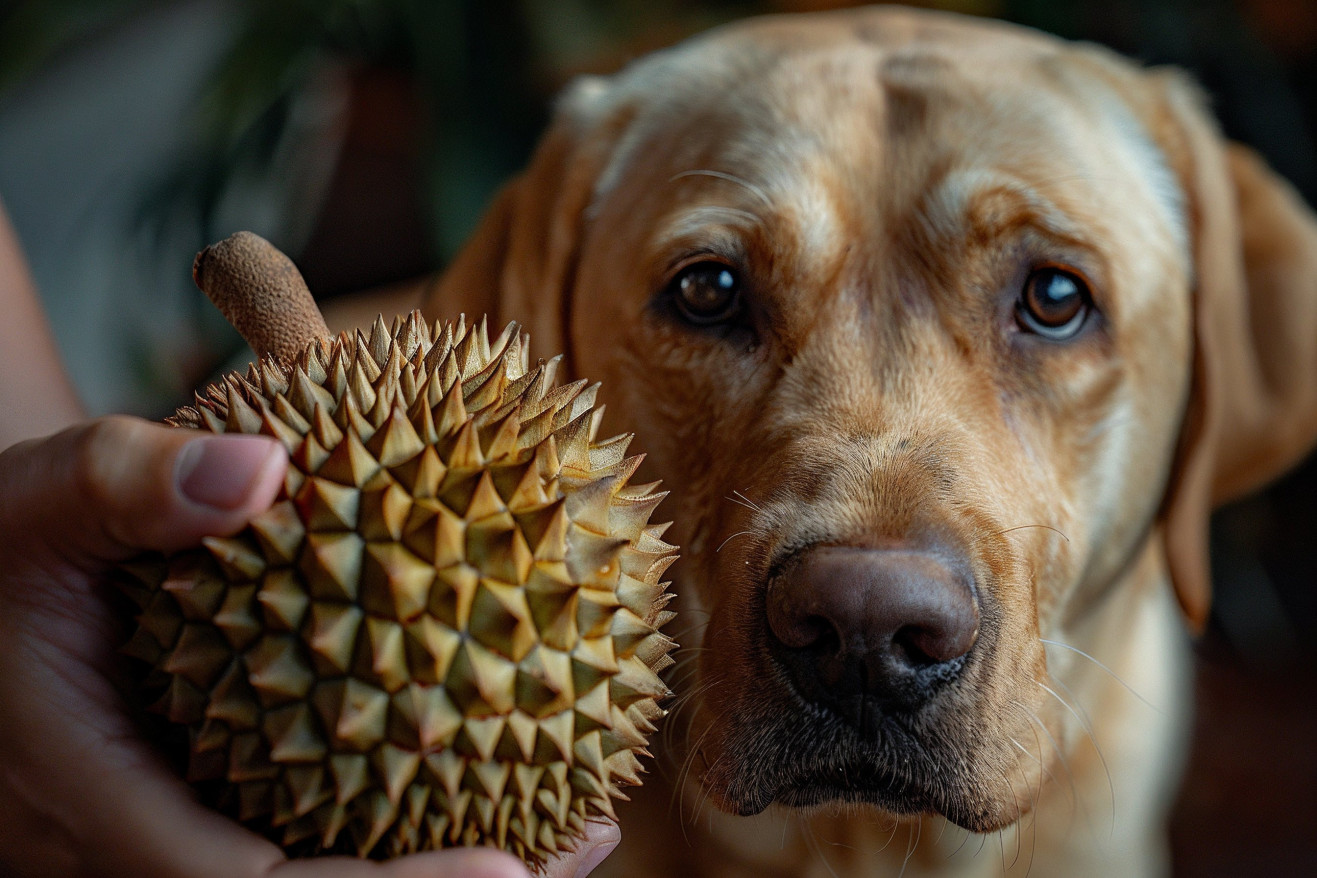Can Dogs Eat Durian? A Comprehensive Look
4 April 2024 • Updated 2 April 2024

You may have asked yourself this question as you've enjoyed the pungent fruit, but can dogs eat durian? No, dogs cannot eat durian. The fruit is full of compounds that are poisonous to dogs and can lead to vomiting, diarrhea, and other negative symptoms. Both the flesh and seeds of the durian can also lead to an obstruction in a dog's digestive system. Therefore, it's best to avoid giving dogs durian in any form.
While we've covered why durian isn't good for dogs, we'll now take a deep dive into research from a variety of fields. From veterinary science to food science, we'll cover the potential risks and even some potential unintended benefits of durian for dogs. This comprehensive look will help you better understand whether or not you should let your dog try any exotic fruit.
Can dogs eat durian?
Nutritional Profile and Potential Benefits of Durian for Dogs
Durian is packed with vitamins, minerals, and antioxidants that offer potential health benefits for dogs. As Buddydoc highlights, it contains vitamin C to support the immune system, vitamin A for vision and skin health, B vitamins like niacin and riboflavin for metabolism, and antioxidants that may provide anti-cancer benefits. It's also a good source of fiber to aid digestion.
The high fat and calorie content of durian could be advantageous for underweight dogs needing to gain weight, according to Pet Lovers Centre. However, as Modern Vet cautions, too much fat can lead to pancreatitis, so portion control is crucial.
While durian offers some nutritional perks, moderation is key. Before introducing it to your pup's diet, consult your veterinarian to ensure it's appropriate for their individual needs. Durian should only be an occasional treat, not a dietary staple. With proper guidance, you can let your dog reap some of durian's benefits while avoiding potential hazards.
How to Prepare and Portion Durian for Dogs
Although durian can be a source of important nutrients for dogs, it is important to prepare and portion the fruit properly to avoid potential dangers. As Pet Master Singapore points out, the rind, seeds, stems, and leaves of the durian fruit are not edible and can be toxic to dogs, so they need to be removed before you give your dog any durian.
Portion sizes will depend on the size and weight of your dog. Pet Master Singapore says that dogs should be limited to 100 grams of durian flesh per portion. Overconsumption can lead to digestive upset, obesity, and other health issues, according to Pawly Clinic.
To make sure that you can safely give your dog durian as an occasional treat, make sure to remove the rind and all non-flesh parts of the fruit. Then, only give your dog small pieces and monitor their response. As K9 Culture explains, it’s important to be careful and conservative when adding durian to your dog’s diet. It’s also a good idea to talk to your vet before giving your dog durian.
Symptoms of Durian Toxicity and What to Do If a Dog Eats Durian
If a dog eats durian or durian seeds, there are a number of symptoms of toxicity to be aware of. According to Wag!, these can include vomiting, diarrhea, lethargy, abdominal bloating, cramps, weakness, fatigue, and other digestive issues. Durian seeds are especially dangerous because they can contain small amounts of cyanide, which can be toxic and even fatal in large doses.
As Spoiled Hounds notes, symptoms of cyanide poisoning from durian seeds include dilated pupils, shock, vomiting, cardiac arrhythmia, and skin irritations. Durian seeds can also cause an intestinal blockage if swallowed, which would require immediate medical intervention.
If you suspect your dog has eaten durian or durian seeds, it’s important to get them to a vet as soon as possible. Pet Master Singapore also recommends watching for any signs of adverse reactions and contacting a vet if you notice any concerning symptoms. To avoid any potential issues, make sure to keep durian out of your dog’s reach.
Other Fruits and Veggies That Are Safe and Healthy for Dogs
While durian isn't the best option for dogs, there are many other fruits and vegetables that are safe and healthy and can be used as an occasional treat. The American Kennel Club lists apples, bananas, blueberries, cantaloupe, cranberries, cucumbers, mangoes, pears, pineapple, pumpkin, raspberries, strawberries, and watermelon as some of the best options.
These fruits and vegetables are full of vitamins, minerals, fiber, and antioxidants that can be good for dogs. For example, blueberries are full of antioxidants, cucumbers can help with weight management, and pineapple has an enzyme that can help with the digestion of protein, according to WebMD. Meanwhile, Raleigh Vet points out that carrots, green beans, sweet potatoes, and broccoli can be good natural treats for dogs.
It's important to introduce new fruits and vegetables to your dog in small amounts and watch for any adverse reactions, as some dogs may be sensitive to certain options. Fruitables also notes that it's important to use these nutrient-dense options in moderation to ensure that your dog's diet stays balanced and healthy.
Special Health Conditions and Dog Breeds to Keep in Mind
Although durian can offer some nutritional advantages for dogs, there are some health conditions and dog breeds that may make it more dangerous or even contraindicated. According to Buddydoc, durian is high in potassium, so it should be avoided for dogs with kidney disease. In addition, the high fat and calorie content of durian can be especially dangerous for overweight or obese dogs, and it could lead to pancreatitis, as mentioned by Modern Vet.
There are also some dog breeds that may be more sensitive to the potential toxins in durian. As discussed in Dog Hutch's article, some breeds may have a harder time digesting the fruit or be more likely to experience negative side effects. In general, it's best to avoid giving durian to dogs with any preexisting health conditions.
It's important to talk to your vet before giving your dog durian or any other new food. They can let you know if durian is safe for your dog based on their unique health needs and circumstances. This will help you decide if durian can be given to your dog as a special treat.
Conclusion: Should You Feed Durian to Your Dog?
In summary, the research presented in this article indicates that while durian does have some nutritional value, the potential risks of feeding it to dogs outweigh the potential benefits. The fruit's compounds are toxic and can cause a variety of health problems for dogs.
If you are considering feeding durian to your dog, it's important to do so with caution and in moderation. This includes making sure that the fruit is prepared properly by removing the rind, seeds, stems, and leaves. It's also a good idea to talk to your veterinarian before feeding durian to your dog to get their advice based on your pet's specific health and nutritional needs.
In the end, the research is clear—dogs should generally not be fed durian. The risks, which include digestive problems, intestinal blockages, and potential toxicity, outweigh the limited benefits that this exotic fruit can offer. To ensure your dog's health and safety, it's best to stick to other fruits and vegetables that are safe and healthy to feed to dogs.


